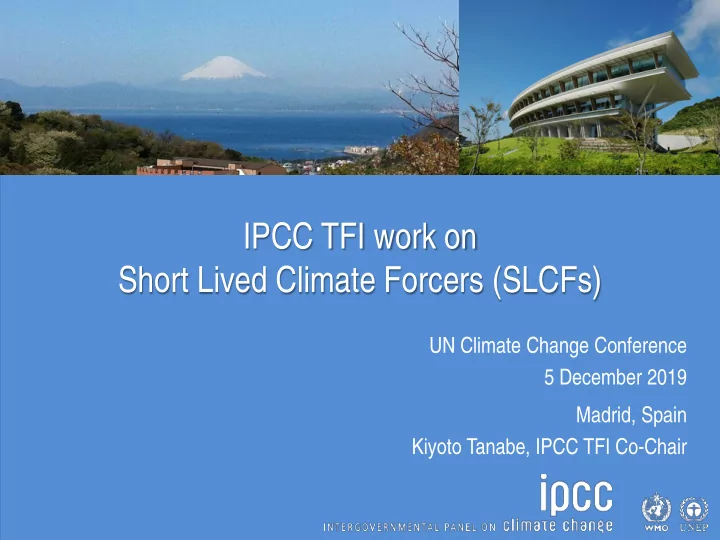

IPCC TFI work on Short Lived Climate Forcers (SLCFs) UN Climate Change Conference 5 December 2019 Madrid, Spain Kiyoto Tanabe, IPCC TFI Co-Chair
Background: Emerging Issue - SLCFs o Recently, the potential importance of reducing emissions of short-lived climate forcers (SLCFs) such as methane, black carbon, and precursors of tropospheric ozone is recognized more and more • to mitigate climate change ; • to improve air quality ; and therefore • to bring near-term co-benefits in terms of human health, agricultural yields and ecosystems.
Background (2017-2018) 2017 IPCC-46 (Montreal, Canada) decided to approve the proposal for an expert meeting on SLCFs to discuss issues on estimation of emissions and estimations of climate effects Decision IPCC/XLVI-6 2018 An expert meeting on SLCFs was organized jointly by IPCC TFI and WGI. It took place in Geneva, Switzerland in May 2018 The meeting report is at: https://www.ipcc-nggip.iges.or.jp/public/mtdocs/1805_Geneva.html
Expert Meeting on SLCFs – May 2018 Some conclusions and recommendations of the expert meeting on SLCFs: • Science on SLCFs has advanced. Careful consideration is required in consolidating existing inventory methodology • All SLCFs should be considered in the future TFI work Black Carbon, Organic Carbon, PM 2.5 , Nox, CO, NMVOC (including BVOC), SO 2 and NH 3 were considered at this expert meeting CH 4 and HFCs were not considered because they are already covered in the 2006 IPCC Guidelines for National Greenhouse Gas Inventories • SLCFs reporting should be in mass units, not in CO 2 equivalents • IPCC can play an important role and has relevant experience and resources to develop guidance for national SLCFs inventories
IPCC-49 (Kyoto, Japan) – May 2019 IPCC-49 decided to approve that the IPCC Task Force on National Greenhouse Gas Inventories produces an IPCC Methodology Report on Short-lived Climate Forcers following the Appendix A to the Principles Governing IPCC work Decision IPCC-XLIX-7 IPCC-49 decided to approve the revised budget for 2019 and the proposed budget for 2020, noted the forecast budget for 2021 and the indicative budget for 2022 Decision IPCC-XLIX-8
IPCC-49 Decision-XLIX-7 on SLCFs Approach The preparatory work for the Methodology Report (including supporting materials and • scoping) is completed as soon as possible, starting in the AR6 cycle. Followed by further methodological development in the AR7 cycle Output and Timeline Expert meetings will produce a series of supporting materials to be published after • each meeting but no later than 2022 These supporting materials will be used to inform the scoping of methodological work • for SLCFs The scoping meeting will take into consideration the work on SLCFs underway in the • reports of Working Group I (April 2021) and III (July 2021) The outline will be presented for approval to the Panel soon after the scoping meeting • Required Activities Technical analysis work by TFI TSU with other experts • 3-4 Expert meetings • Scoping Meeting • Approval of outline by the Panel •
TFB-31 (Osaka, Japan) – November 2019 At the 31 st meeting of IPCC Task Force Bureau on National Greenhouse Gas Inventories (TFB-31), TFB considered Decision IPCC-XLIX-7 on SLCFs and agreed on the following work plan of IPCC TFI: 2020 March: Expert meeting on AFOLU and Waste – Rome, Italy or Bangkok, Thailand June-July: Expert meeting on Energy and IPPU – Istanbul, Turkey 2021 First half: Expert meeting on knowledge gaps (all sectors) Second half: Exerting meeting on any follow-up issues, outcomes of WGI and WGIII; (possibly) a preliminary draft of the Outline of Methodology Report on SLCFs 2022 First half: Scoping meeting Second half: Approval of the Outline at IPCC-XX Session A new Methodology Report on SLCFs will be produced after 2023… All dates and venues are to be confirmed
Thank you https://www.ipcc-nggip.iges.or.jp/index.html
Recommend
More recommend